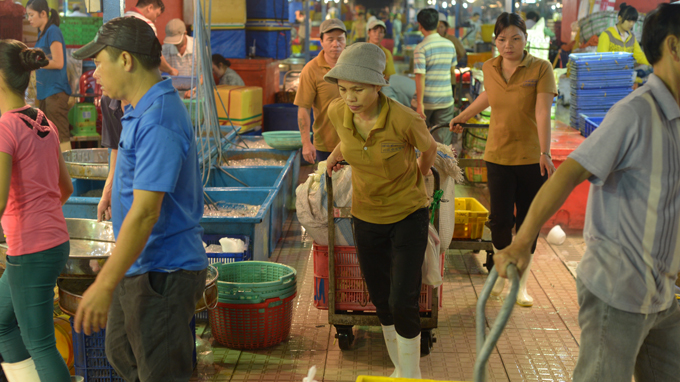There are 77 jobs that employers are prohibited to hire women under Decree No. 26/2013 issued by the Ministry of Labor, War Invalids and Social Affairs (MOLISA) that took effect on Dec. 15.
The newly-approved decree is based on Article 160 of the 2012 Labor Code, which bans women from doing jobs that could badly affect their reproductive function and child fostering duties.
It prohibits employers from hiring women in general for 38 jobs and hiring pregnant women or those with babies less than 12 months old for another 39 jobs.
Doan Thi Tham, an autopsy surgeon at Cao Bang forensic examination center in the northern province of Cao Bang, admitted to Tuoi Tre that autopsy surgery [one of the 77 banned jobs] seems to be an inappropriate job for women.
However she said she has done it for years and has got used to it. “I cannot remember how many bodies I’ve operated on over the last ten years. Sometimes I feel self-pity but I’ve never thought that I would stop doing this job” – Tham said.
Dong, director of Cao Bang forensic examination center, said there are only three autopsy surgeons in the province. “We need at least four autopsy surgeons but we never get enough. Since the decree has taken effect, we’ll have to find another job for Tham” – Dong said.
Love hard work
Meanwhile, many female workers at Binh Dien wholesale market of agriculture products in Ho Chi Minh City’s district 8 said the decree is “hard to believe”.
Hoang Thi Van, 18, hailing from Dien Chau district in Nghe An central province, is seen hurrying back and forth with trays of fish at the market. She starts her working day as early as 1 a.m. and is paid VND3,000 for pulling a tray of 11 to 15 kilograms of fish from a truck to her employer’s shop.
“I often pull 4 to 5 trays per time and is paid VND150,000 to VND200,000 per day in total” – Van said.
When asked if she is no longer allowed to do this job, Van said: “I will return home to work in the paddy field. Although other jobs may not be as hard as my current one, they provide me with less money and I need to support my parents and 4 siblings”.
Nam Moi, a fish shop owner at the market, said she hires about 30 female workers to transport and process seafood per day.
Hien, owner of Hai Yen fish shop at Binh Dien market, told Tuoi Tre: “A small shop hires 5 to 10 workers to transport fish while a large shop hires dozens of workers. How can we find enough laborers if we are banned from hiring women for this job?”.
|
Specifically, women in general are banned from doing various professions, including metal processing, seafaring, carrying goods of over 50 kg and work that requires regular contact with human corpses, diving, doing dredging or mining work. Other jobs in this list are oil well drilling, gas exploration, setting up, maintaining and repairing high-voltage power lines, repairing or decorating the outside of tall buildings at a height of above 12 meters without any protection, among others. Meanwhile, female workers who are pregnant or have children under one year old are banned from work that involves exposure to toxic chemicals, radioactive substances or work that requires heavy physical exertion such as operating large machinery, carrying over 20 kg, and other jobs like boiler operation, and work requiring workers to stay in dirty and stinky water for at least four hours a day or for over three days a week, or jobs that require them to work in uncomfortable environment such as places that lack fresh air or have extreme temperatures or confined narrow spaces. |





















































